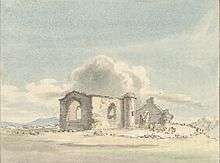Dydd Santes Dwynwen
Dydd Santes Dwynwen (IPA: [ˈdɨːð ˈsantɛs ˈdʊɨnwɛn]; Welsh for St Dwynwen's Day) is considered to be the Welsh equivalent to Valentine's Day and is celebrated on 25th of January every year. It celebrates Dwynwen, the Welsh saint of lovers.[1]
Story

Much of Welsh history is based on stories and songs which were traditionally passed on by word of mouth. As such, the original tale has become mixed with elements of folktales and Celtic stories, and so there are a number variations on the tale.
In the 5th century, Dwynwen fell in love with a man named Maelon Dafodrill. Maelon returned Dwynwen's feelings but they could not be together, for Dwynwen's father forbade the marriage and her father had already promised her to someone else. Distraught by her love for Maelon, Dwynwen prays she would fall out of love with him.
After falling asleep, or possibly while still awake in a woods she had run to in her distress, Dwynwen was visited by an angel, who appeared carrying a sweet potion designed to erase all memory of Maelon and turn him into a block of ice. God then gave three wishes to Dwynwen. First she wished that Maelon be thawed, second that God met the hopes and dreams of true lovers and third that she should never marry ever. All three were fulfilled, and as a mark of her thanks, Dwynwen devoted herself to God's service for the rest of her life.[2]
Llanddwyn
Dwynwen became a nun, fulfilling her wish to never marry. She left for the island of Anglesey and built a Church, which became known as Llanddwyn, literally meaning "Church of Dwynwen". Its remains can still be seen today on the island of Llanddwyn, off the coast of Anglesey. The smaller island also contains Dwynwen's well, where, allegedly, a sacred fish swims, whose movements predict the future fortunes and relationships of various couples. Another tradition claims that if the water boils while visitors are present, then love and good luck will surely follow.[2]
Celebration
The popularity and celebration of St Dwynwen's day has increased considerably in recent years, with special events, such as concerts and parties, often held and greetings cards printed. Although still not as popular as St Valentine's Day in February, St Dwynwen is certainly becoming better-known among today's population of Wales.[2] A big boost for St Dwynwen’s Day came in 2003 when the Welsh Language Board teamed up with UK supermarket Tesco to distribute 50,000 free cards in 43 of its Welsh stores. One card was inserted with a special heart, the finder of which would be entitled to a prize. The board also suggested numerous ways to celebrate the feast besides sending cards, for example, giving a "lovespoon" to your partner. Over 300 years ago in Wales, young men would carve wooden spoons known as lovespoons and would present these spoons to a woman as part of a marriage proposal.
The Welsh often celebrate with concerts and parties, and exchange Dydd Santes Dwynwen greetings cards.[3]
Children's versions
This version of the story is told to younger children, usually in primary school or nursery as it is generally considered the most appropriate for children.
Dwynwen was the beautiful daughter of Brychan Brycheiniog, who was said to have had eleven sons and twenty-four daughters (although these figures vary greatly, to the extent of suggesting he had over fifty children). She met and fell madly in love with a man called Maelon, and he reciprocated her feelings. She asked her father if she could marry Maelon but Brychan disliked Maelon and refused to give his permission. Maelon begged, as did Dwynwen, but Brychan would not relent and Maelon was forced to leave. Dwynwen was so upset that she ran into the forest. There, she met an angel in a dream who granted her the position of the Saint of Love.
References
- Davies, John; Jenkins, Nigel (2008). The Welsh Academy Encyclopaedia of Wales. Cardiff: University of Wales Press. p. 228. ISBN 978-0-7083-1953-6.
- ""St Dwynwen's Day", Amgueddfa Cymru". Archived from the original on 2012-01-27. Retrieved 2013-07-24.
- Mayer, James. "St. Dwynwen's Day: An Icy Day for Lovers". Smithsonian Institution. Archived from the original on 2014-08-10.